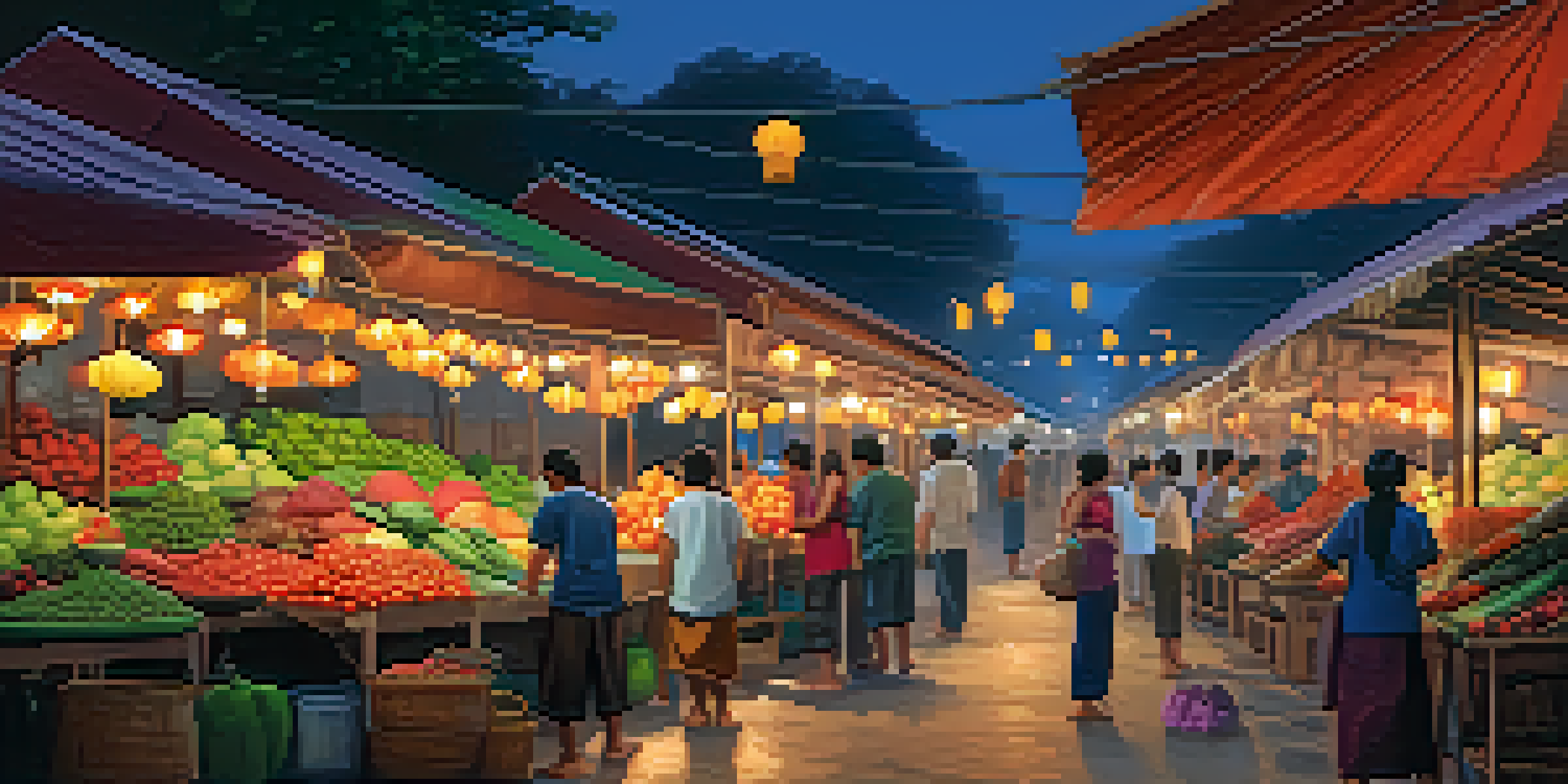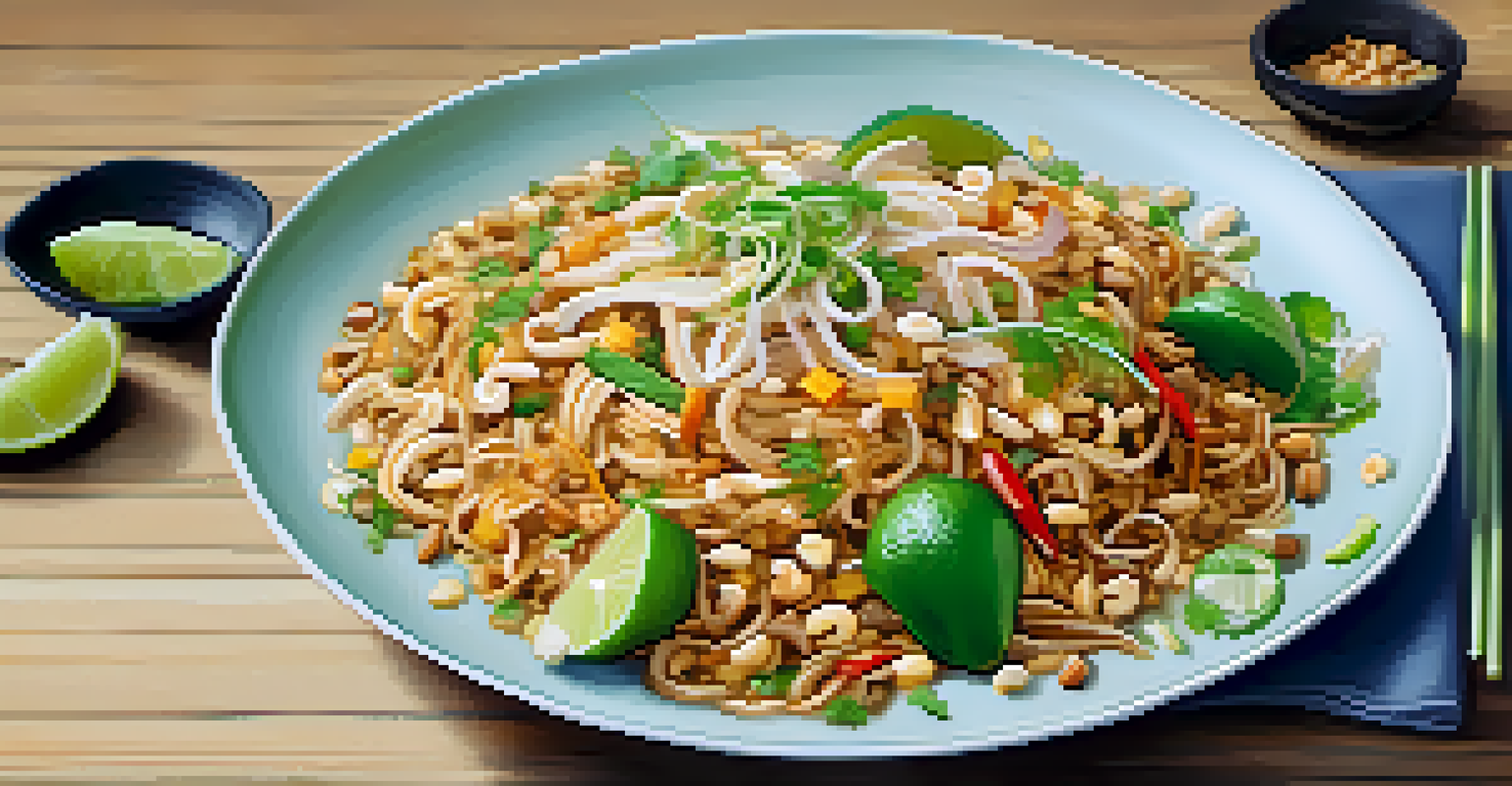Essential Thai Phrases Every Traveler Should Learn

Greetings: The Key to Thai Culture and Politeness
In Thailand, greetings are more than just a formality; they reflect the culture's warmth and respect. The most common greeting is 'Sawasdee' (สวัสดี), which you can use at any time of day. Adding 'krub' (ครับ) if you're male or 'ka' (ค่ะ) if you're female makes it even more polite.
The greatest gift of life is friendship, and I have received it.
When greeting someone, it's customary to bow your head slightly with a 'wai' gesture, where you place your hands together in a prayer-like position. This simple act shows respect and acknowledges the other person's importance. It's a beautiful way to connect with locals.
Remember, using greetings can go a long way in making a good impression. It shows that you appreciate their culture, making your interactions more pleasant and engaging.
Basic Questions: Navigating Conversations Easily
Asking questions is essential for exploring a new place. Phrases like 'Chai mai?' (ใช่ไหม?) meaning 'Is that correct?' or 'Khaao rao nai?' (ข่าวเราไหน?) meaning 'Where is it?' can help you gather information without much hassle. These phrases are simple yet effective.

When you want to ask for directions, saying 'Tee nai?' (ที่ไหน?) translates to 'Where?' which is a good starting point. Most locals will appreciate your effort to communicate. Plus, you may get a chance to practice your Thai as they point you in the right direction.
Greetings Reflect Thai Politeness
Using greetings like 'Sawasdee' and the 'wai' gesture shows respect and appreciation for Thai culture.
A little goes a long way; mastering these basic questions can open up a world of experiences. You'll find that locals are more willing to help, enhancing your travel adventure.
Ordering Food: Delight Your Taste Buds with Ease
Thai cuisine is a highlight of any trip, and knowing how to order can enhance your dining experience. Start with 'Ao...' (เอา...) followed by the dish name, and you're on your way. For instance, 'Ao Pad Thai' (เอา ผัดไทย) means 'I want Pad Thai.'
Traveling – it leaves you speechless, then turns you into a storyteller.
Don’t forget to add 'Mai phet' (ไม่เผ็ด) if you prefer your dish less spicy. Thai food can be intense, so expressing your spice preference can save you from a fiery surprise! Learning about the local dishes can also spark conversations with restaurant staff.
Enjoying local food is one of the best parts of traveling, and knowing how to order can make it all the more delightful. Your taste buds will thank you, and you'll leave with a deeper appreciation for Thai culture.
Transportation: Getting Around Thailand with Confidence
Navigating Thailand’s transportation can be a breeze when you know a few key phrases. For taxis, simply say 'Tuk-tuk!' (ตุ๊กตุ๊ก) if you want a ride. You can also ask 'Phaak rao nai?' (พักเราไหน?) to inquire about stops and destinations.
Using public transport? 'Suan' (สวน) means 'park,' and 'Bai' (ไป) means 'to go.' Combined, you can ask 'Bai Suan nai?' (ไปสวนไหน?), making it easier to find your way to beautiful parks or attractions.
Basic Questions Enhance Travel
Mastering simple phrases like 'Chai mai?' and 'Tee nai?' can make navigating Thailand easier and more enjoyable.
Understanding these transportation phrases will empower you to explore freely. You'll feel more confident as you hop from one destination to another, making the most of your Thai adventure.
Shopping: Bargaining and Expressing Preferences
Shopping in Thailand is an experience in itself, especially at markets. Use 'Tao rai?' (เท่าไหร่?) to ask 'How much?' when looking to buy. This opens the door for bargaining, which is common in Thai markets.
If you want to express your interest in a product, saying 'Chan chao' (ฉันชอบ) means 'I like it.' This can help you build rapport with the seller and may even lead to a better price.
Bargaining is part of the fun, and using these simple phrases can make the experience more enjoyable. You'll find that shopping in Thailand is not just about the items you buy, but the connections you make along the way.
Emergency Phrases: Stay Safe While Traveling
Knowing how to ask for help can be crucial during your travels. Phrases like 'Chai phuying?' (ชายผู้หญิง?) meaning 'Is there a man/woman?' can be vital in an emergency situation. It’s essential to be prepared and know how to communicate your needs.
'Tor khun' (ต่อคุณ) translates to 'Please help me,' and it’s a straightforward way to get assistance. The kindness of the Thai people means that when you reach out, you’ll likely receive help quickly.
Cultural Expressions Build Connections
Understanding phrases like 'Khob khun' for thank you fosters positive interactions and enriches your experience in Thailand.
Having these emergency phrases in your back pocket not only keeps you safe but also allows you to navigate unexpected situations with confidence. Being prepared can turn a potential crisis into a manageable moment.
Cultural Expressions: Understanding Thai Etiquette
Understanding Thai culture is vital for a respectful visit. A phrase like 'Khob khun krub/ka' (ขอบคุณครับ/ค่ะ) means 'Thank you.' Expressing gratitude is appreciated and can help foster positive interactions.
Another important phrase is 'Sawatdee pee mai?' (สวัสดีปีใหม่?) which means 'Happy New Year.' This can be particularly useful if you’re visiting during the holiday season, allowing you to connect with locals and celebrate together.

Being aware of cultural expressions not only enriches your experience but also shows respect for the local customs. This understanding can create a more meaningful connection with the culture.
Everyday Phrases: Enhancing Your Travel Experience
Incorporating everyday phrases can greatly enhance your interactions. Learn simple expressions like 'Mai pen rai' (ไม่เป็นไร), which means 'No worries.' This phrase captures the relaxed Thai attitude and can help you connect with locals.
Additionally, 'Khun chue arai?' (คุณชื่ออะไร?) means 'What is your name?' This can open up conversations and help you meet new friends during your travels. Building relationships can make your trip unforgettable.
Using these everyday phrases makes your experience richer and more enjoyable. It shows you’re making an effort to connect, which is always appreciated in Thailand.